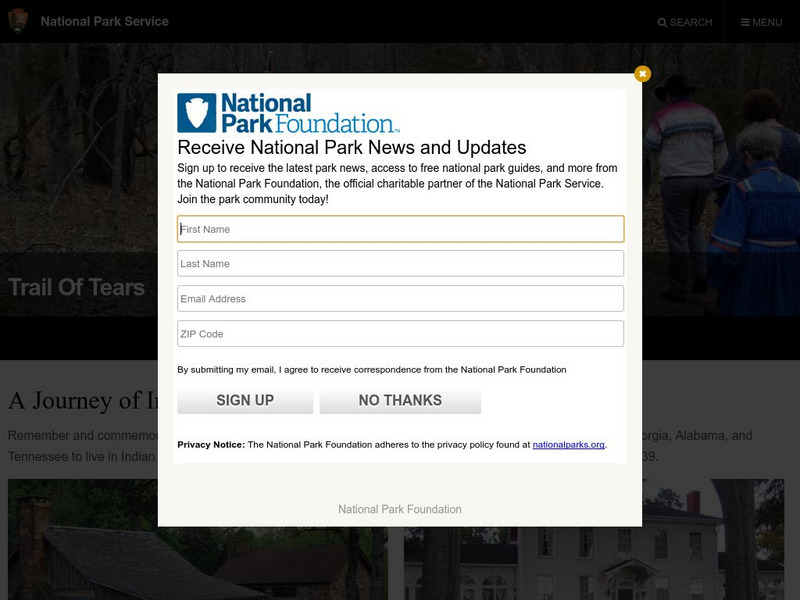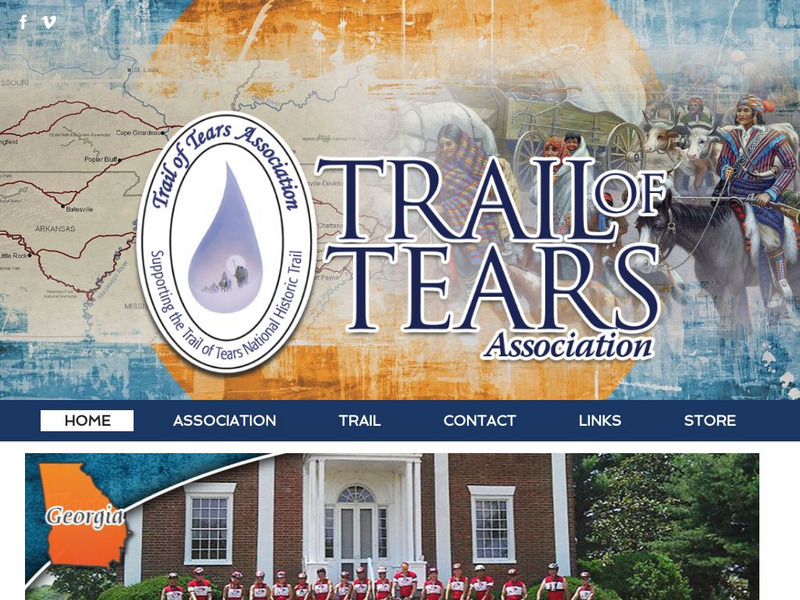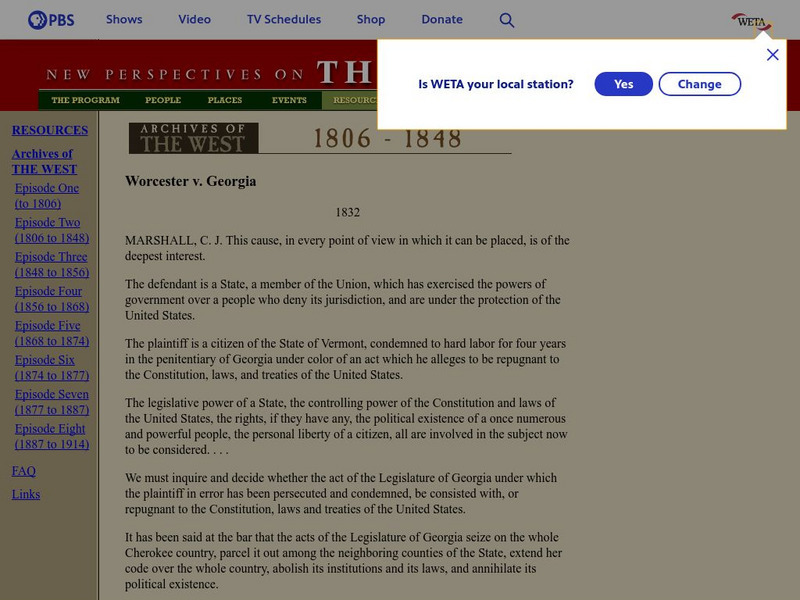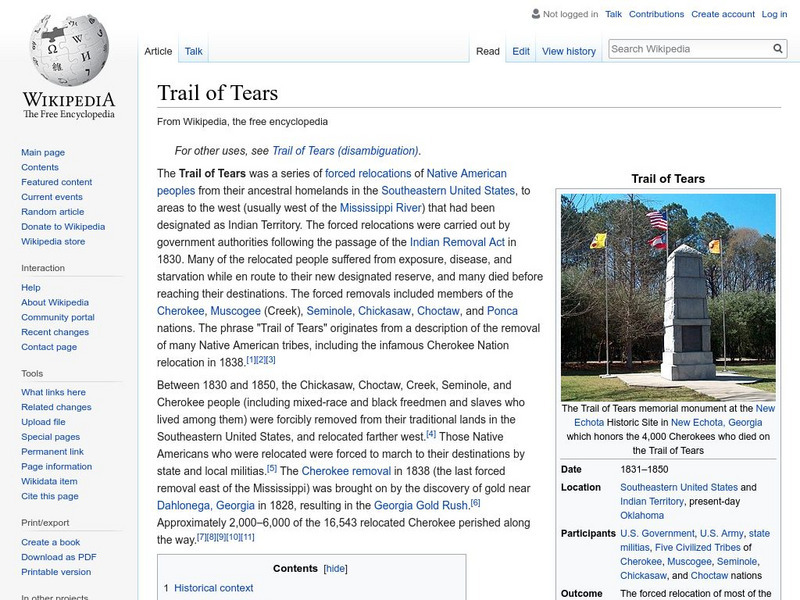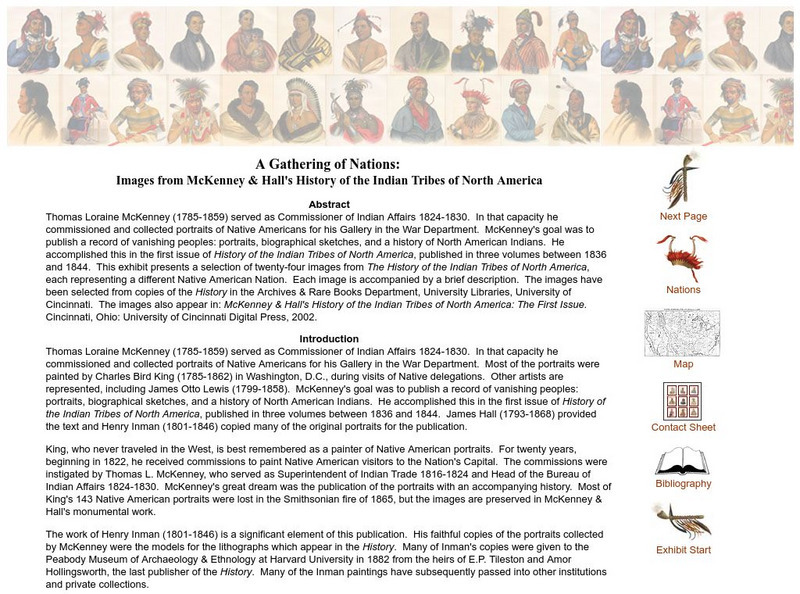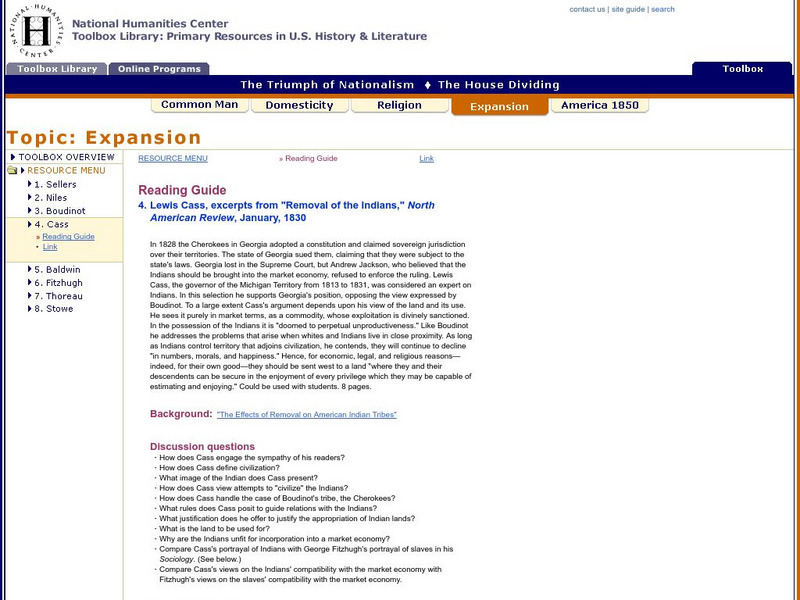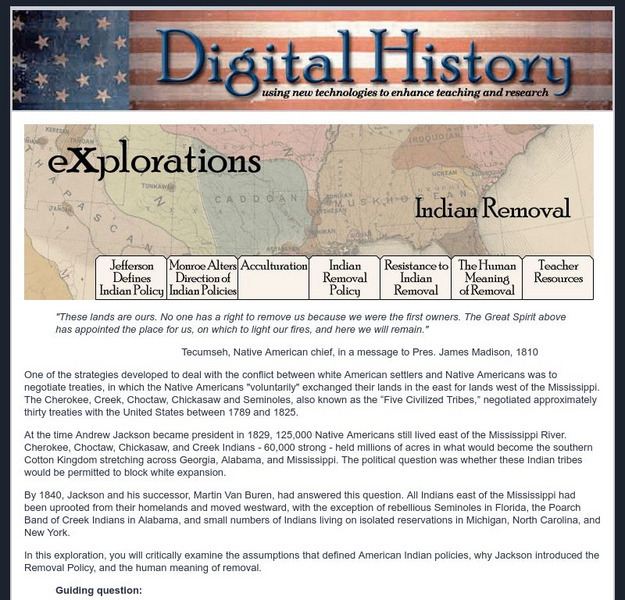Georgia Humanities Council and the University of Georgia Press.
New Georgia Encyclopedia: Cherokee Removal
Reveals the story behind the forced removal of the Cherokee Indians from Georgia to Indian Territory in present day Oklahoma.
Digital Public Library of America
Dpla: Cherokee Removal and the Trail of Tears
The sources in this primary set uses documents, images, and music to reveal the story of Cherokee removal, which is part of a larger story known as the Trail of Tears. Includes teaching guide.
Civil War Home
Home of the American Civil War: The Cherokee and the Confederacy
This site contains the document in which the Cherokee pledge their allegiance to the Confederacy.
Oklahoma State University
Oklahoma Historical Society: An Early Account of the Cherokees [Pdf]
A first-hand account describing the Cherokee Native Americans during the period of their displacement (1837) from the southern United States to Oklahoma Indian territory.
Oklahoma State University
Oklahoma Historical Society: History of the Cherokees, 1830 1846 [Pdf]
A good scholarly article which examines the economic situation of the Cherokee both in their territory in Georgia and their new lands in Oklahoma. The article provides a good discussion on their early history after their removal to...
Curated OER
National Park Service: Trail of Tears National Historic Trail
National Park Services provides an overview of the Trail of Tears, a nine state wide stretch of America the Cherokee Indians were pushed across by the Federal government in the 1830s.
Other
Trail of Tears Assoc: The Story Trail of Tears National Historic Trail
Follow the early history of Native American and European contact in America. As more settlers moved west, a law was passed to relocate the Cherokee from Arkansas. The routes they followed and the cruelties they suffered came to be known...
Smithsonian Institution
Smithsonian: National Museum of the American Indian: The Removal Act
At first, the Trail of Tears only described the Cherokee removal of 1838. Later it included the removals of all southeastern Native nations. Take a close look at these primary sources from the Smithsonian which include a reproduction of...
Curated OER
Wikipedia: National Historic Landmarks in Oklahoma: Cherokee National Capitol
Capitol of the Cherokee nation from 1869 to 1907, when Oklahoma became a state.
Curated OER
National Park Service: Pea Ridge National Military Park: Colonel Stand Watie
A brief biography of Stand Watie, who was a colonel at the Battle of Pea Ridge, but became the only Native American general in the Civil War. From the National Park Service.
PBS
Pbs: Archives of the West: Worcester v. Georgia
On this PBS website you can read the text of the Supreme Court ruling on the legality of the removal of the Cherokees from Georgia by the Georgia legislature and Georgia's prosecution of a man living on those lands.
Georgia Humanities Council and the University of Georgia Press.
New Georgia Encyclopedia: Worcester v. Georgia (1832)
Discussion of the lawsuit filed by Samuel Worcester against the state of Georgia protesting the way the state handled the Cherokee lands. The case went to the Supreme Court where although Chief Justice Marshall ruled in favor of the...
Wikimedia
Wikipedia: Trail of Tears
This site from Wikipedia provides a description of the Trail of Tears. Also given is some background information that led to the removal of the Cherokees from northern Georgia as well as information on the actual removal process.
Other
A Gathering of Nations: Images of History of the Indian Tribes of North America
A selection of twenty-four images from The History of the Indian Tribes of North America, each representing a different Native American Nation. Each image is accompanied by a brief description.
National Endowment for the Humanities
Neh: Edsit Ement: Traditions and Languages of Three Native Cultures
This lesson plan helps students learn aspects of three Native American languages, the Tlingit, Lakota, and Cherokee. Five lessons lead teachers and students through traditions, similarities and differences, and the importance of...
Other
North Georgia History: Cherokee in North Georgia
This site from North Georgia.com provides the history of the Cherokee in North Georgia. This site begins with the development of the Cherokee Nation. Clicking on the next three sections will take you through their loss of their lands.
Curated OER
Wikipedia: National Historic Landmarks in Georgia: New Echota
In 1825, officially designated capital of the Cherokee Nation.
Curated OER
Wikipedia: National Historic Landmarks in Georgia: Chieftains
Home of Cherokee Nation chief Major Ridge.
National Humanities Center
National Humanities Center: Toolbox Library: Lewis Cass: Triumph of Nationalism: America, 1815 1850
An argument by the Michigan Territorial governor, Lewis Cass, that claimed state laws superseded the rights claimed by Native American tribes like the Cherokee.
Other
Civics Resources: Worcester v. Georgia
In December 1829, President Andrew Jackson announced his Indian removal proposal in an address to the U.S. Congress. In 1830 Congress passed the Indian Removal Act, which authorized the president to grant the Indians unsettled lands west...
Tennessee History For Kids
Tennessee History for Kids: Nancy Ward
She was born as a member of the Cherokee tribe sometime around 1738, and at that time her name was Nanyehi. As a young woman she took part in battles against other Native American tribes, and largely because of this she became a leader...
Other
Crystalinks: Trail of Tears
Detailed information on the Trail of Tears which refers to the forced relocation of the Cherokee Native American tribe to the Western United States in 1838-39. This tragic event resulted in the deaths of an estimated 4,000 Cherokee...
Independence Hall Association
U.s. History: The Trail of Tears: The Indian Removals
The Cherokee were not the only Native Americans affected by the Indian Removal Policy. Read about the Sac and Fox Indians in Illinois, and the Seminole in Florida. In addition, read about the many attempts, including a law suit filed by...
Digital History
Digital History: Explorations: Indian Removal
In this exploration, students will examine the federal policy toward American Indians, why President Jackson introduced the Indian Removal Policy, Native American resistance to removal, and the human meaning of removal.


